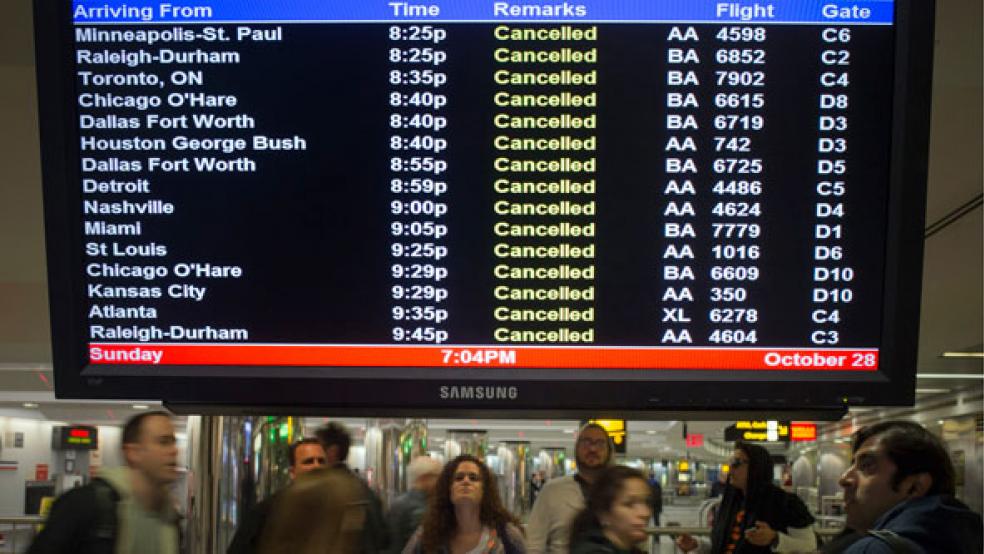Transportation ground to a halt along the Northeast coast on Monday, stranding local rail commuters, cruise passengers and air travelers from as far away as Europe and Asia, as Hurricane Sandy prompted closure of air, ship, rail and even highway service. The transport woes also hit cargo operations, adding another dimension to the storm's economic toll.
New Jersey's Garden State Parkway, which has been ranked among the busiest U.S. toll roads, was closed Monday in both directions along its southern 63 miles because of flooding. Massive cargo container operations in New York and New Jersey shut down very early Monday, and will stay closed indefinitely, the port authority said, stranding millions of dollars worth of goods arriving for the holiday season.
RELATED: Tornadoes, Hurricanes, Floods: Why You'll Pay, Too
The cost of the cargo disruptions probably won't be large, said Arthur Hatfield, managing director of equity Research at Raymond James in Memphis, Tenn. While cargo gets backed up it eventually gets delivered. "Nothing disappears," he said. "The only time we've ever seen a storm that had a lasting or immediate impact on logistics and or freight volumes was Katrina," he added. Sandy is a Category 1 hurricane, he noted. "You've got to remember Katrina was a Category 5 and the storm surge was something they'd never seen."
CSX Corp., the nation's second-largest publicly owned railroad company, shut its network between Richmond, Va., and Albany, N.Y., early Monday. The closure included Boston and extended as far west as Brunswick, Md. Norfolk Southern Corp said rail traffic from Virginia through New England could be affected by flooding and high winds, and told customers to expect delays of at least 72 hours.
Some freight companies said they would keep working where it was possible. "We're going to be doing operations as long as we possibly can, as far as pickup and delivery goes," said Chris Stanley, spokesman for FedEx Corp, the second-largest package delivery company in the U.S. "If we are able to safely move, we will." United Parcel Service Inc began rerouting packages and airplanes over the weekend. On Monday it suspended delivery in Delaware, Maryland and Washington, D.C., but dispatched delivery trucks in Manhattan, Connecticut, Westchester County, Nassau County and Suffolk County.
In New Jersey, UPS sent out about half of its drivers Monday, and most drivers continued working in New England. Operations were normal in Pittsburgh, central Pennsylvania, West Virginia and Virginia, except along the coast. UPS said it was planning for significant snow in some areas. It's "too soon to put any dollars around impacts or to look at any specific sectors," said Susan Rosenberg, a spokeswoman for UPS.
Airlines canceled more than 11,500 flights for Sunday, Monday and Tuesday, including more than 6,800 so far Monday alone, Flight-tracking service FlightAware said. The tracking service said it expected that figure to grow as the storm hits later Monday. Philadelphia's airport was the hardest hit, with 1,220 cancellations on Monday. The service said the three New York area airports had each canceled about 1,000 flights for Monday. New York and Washington, D.C., area airports remained open even though flights have been canceled.
The Federal Aviation Authority said Monday that air traffic control towers were closed at regional airports: Hartford-Brainard and Groton-New London in Connecticut; Northeast Philadelphia in Pennsylvania; Atlantic City and Trenton, New Jersey; and New Castle, Delaware. United Continental Holdings, the world's largest air carrier, canceled 3,700 flights for Sunday through Wednesday, or about 16 percent of total flights scheduled during that period, because of the storm, a spokesman said on Monday.
Delta Air Lines said it canceled roughly 2,100 flights from Sunday night through Tuesday morning. Transportation consultant George Hamlin estimated that Sandy could cost the airline industry hundreds of millions of dollars. On top of lost flight revenue, airlines likely will have to pay their crews extra if they are stranded away from home base. "If you cancel a day or two's flights, it may take some people days to get to where they want to go," he said.
New York suspended service on mass-transit systems for New York, Long Island, Staten Island and Metro-North. PATH train service between New York and New Jersey also was suspended. Amtrak canceled service along the Northeast corridor for Monday, and nearly all service along the Eastern seaboard, through Tuesday.
Carnival Corp canceled two departures, from Chesapeake Bay and Norfolk, Va., because of the storm and shifted departures of other cruise ships. Hotel reservations desks hummed with calls from thousands of stranded travelers, seeking to either cancel or find accommodation around major cities in the Northeast.
Starwood Hotels & Resorts Worldwide Inc - which operates hotels such as Westin, Sheraton - and Marriott International Inc hotel groups received numerous calls about New York reservations. "A lot of people are cancelling," a reservations employee said, but said others are coming because the hotels have power generators.
"People are really just frightened of the storm ... they're frightened of water levels and they're frightened of losing power and they want to be somewhere where they're safe," the employee said. A reservations worker for Marriott said her work day had been "really crazy" with all the calls for cancellations and last-minute reservations, including calls from corporations booking blocks of rooms for their employees.
Corporate representatives for Starwood and Marriott were not immediately available for comment Sunday.
(By Karen Jacobs, Lynn Adler and Nick Zieminski; additional reporting by Sinead Carew, Caroline Humer and Michael Erman in New York; Writing by Alwyn Scott)




